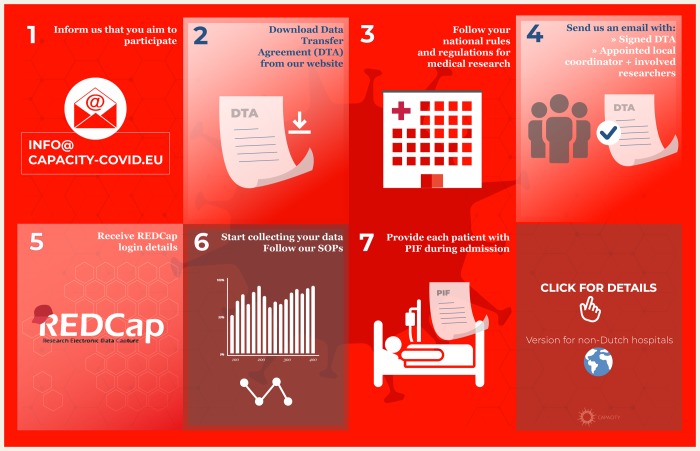From the emerging literature, cardiovascular disease appears to play a prominent role in the COVID-19 pandemic on multiple levels: (i) patients with cardiovascular risk factors and pre-existent cardiovascular disease seem to have an increased risk of a poor outcome;1,2,3 (ii) patients with COVID-19 have been, also in the absence of underlying cardiovascular disease, reported to develop cardiovascular complications;3,4,5 (iii) therapeutics currently prescribed in an experimental setting such as antimalarial and antiviral drugs have known cardiovascular side effects; and (iv) there are concerns, especially on social media, regarding the safety of angiotensin-converting enzyme inhibitors (ACEIs) and angiotensin receptor blockers (ARBs) in relation to COVID-19.3,6 Insufficient evidence is currently available to guide clinicians in the management of these patients.
To accelerate knowledge on the role of cardiovascular disease in the COVID-19 pandemic, standardized and coordinated data collection on a large scale is of pivotal importance.
For this reason, we launched the CAPACITY-COVID (www.capacity-covid.eu) registry on the 23rd of March (Figure 1).
Figure 1.
Infographic.
CAPACITY-COVID offers a comprehensive data collection tool that facilitates uniform data collection of patients infected with SARS-CoV-2. The registry builds upon the Case Report Form (CRF) (https://isaric.tghn.org/covid-19-clinical-research-resources/) released by the International Severe Acute Respiratory and Emerging Infection Consortium (ISARIC) and World Health Organization (WHO) in response to the COVID-19 outbreak. By collecting information in the registry in a standardized manner, we hope this initiative can aid in providing more insight into (i) the incidence and pattern of cardiovascular complications in patients with COVID-19 and (ii) the vulnerability and clinical course of COVID-19 in patients with an underlying cardiovascular disease.
Within CAPACITY-COVID, the ISARIC-WHO CRF has been extended with multiple additional data collection instruments on cardiovascular risk factors, the use of cardiovascular medication and non-steroidal anti-inflammatory drugs (NSAIDs), cardiac biomarkers, ECG, echocardiography, cardiac MRI, chest CT, invasive cardiac procedures, and cardiac complications. Furthermore, cardiac outcomes during admission at 7 and 30 days are collected. A specification on all variables included can be found in the REDCap Codebook on our website.
All patients with a highly suspected or proven infection with SARS-CoV-2 are eligible for inclusion in CAPACITY-COVID. We strongly encourage multidisciplinary collaborative efforts to collect the data, in order to increase the coverage of inclusion across various departments involved in the care of these patients.
In the short term, the primary focus of the consortium will be to develop prognostic models with the collected data. Since the launch of the registry, thus far, 43 of the 71 Dutch hospitals have joined the consortium. Furthermore 19 sites across 10 other countries have expressed their interest to participate. At this moment in time 18 centres have started data collection.
We hereby would like to invite other centres to participate in CAPACITY-COVID. To allow a quick set-up of the project for centres that want to participate, we have developed a portfolio of resources, including the study protocol, patient information form, and standard operating procedures that are all freely available. Please see the infographic (Figure 1) on the steps you have to take to join the consortium.
For more information visit our website: www.capacity-covid.eu.
Supplementary Material
Acknowledgements
Dutch CardiovascularAlliance (DCVA); Netherlands Society of Cardiology (NVVC); Dutch Network for Cardiovascular Research (WCN); Netherlands Heart Registration (NHR); Netherlands Heart Institute (NHI); Dutch Heart Foundation (DHF); and Dutch Patient Organisation for Patients with Cardiovascular Diseases (Harteraad).
Conflict of interest: none declared.
References
References are available as supplementary material at European Heart Journal online.
Marijke Linschoten and Folkert W. Asselbergs*; on behalf of CAPACITY-COVID collaborative consortium
Department of Cardiology, Division of Heart and Lungs, University Medical Centre Utrecht, Utrecht, the Netherlands
* Corresponding author. Department of Cardiology, Division of Heart and Lungs, University Medical Centre Utrecht, Room E03.511, PO Box 8550, 3508 GA Utrecht, The Netherlands. Tel: +31 887553358, Fax: +31 887555423, Email: f.w.asselbergs@umcutrecht.nl
Associated Data
This section collects any data citations, data availability statements, or supplementary materials included in this article.



